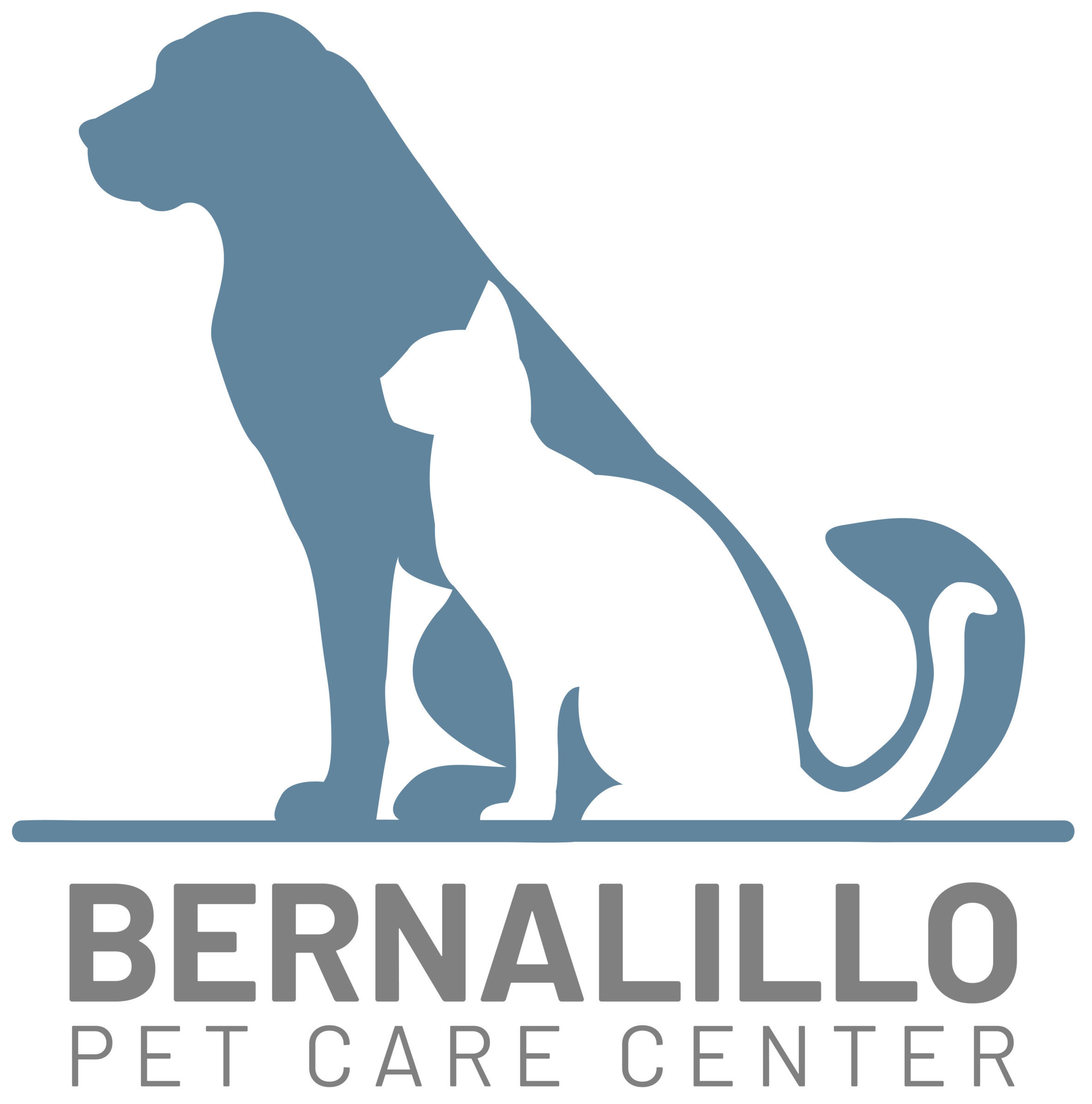Get answers to your questions
FAQs
Our veterinary team has answers to your most frequently asked questions below.

Bernalillo Pet Care Center FAQs
We get asked tons of great questions at Bernalillo. Here are answers to questions we are frequently asked. If you have additional questions that aren’t covered here, please feel free to give us a call at (505)-867-4575.
What are the hospital hours?
Our hospital is open Monday through Friday from 8:00 am to 5:00 pm. On Saturdays, we are open from 8:00 am until noon. We are closed on Sundays.
Do I need to have an appointment?
Yes, we can provide higher quality care by seeing our patients on an appointment basis. We do however accept walk-ins as we are able to do so. Please call ahead of time if you wish to be seen as a walk-in so that we can let you know if we can properly accommodate you and your pet, and determine the best time to come in to minimize your wait time. Keep in mind that walk-in appointments cost more than our regular appointments, and may involve a wait and prolonged appointment times. Walk-ins will be seen in-between scheduled appointments based on the urgency and severity of the situation. If we do not have the capacity to see your pet as a walk-in, and your pet is extremely ill or experiencing a possible emergency, we may refer you to a local emergency clinic or care.
How much will my visit cost?
What forms of payment do you accept?
Do you guys have payment plans?
Unfortunately, we are unable to accept payment plans. Payment for all services and products is due at the time of rendering. However, we do accept payments through third-party financial assistance services such as Care Credit or Scratchpay. We would be happy to discuss these options with you at your appointment. We strongly recommend that you apply for these services prior to your appointment in order for you to be aware of your budget and avoid a delay in your appointment. Please note that if you are not approved for financial assistance, payment will still be due in full at the time of service.
What vaccinations are required?
Yes, it is our policy that all of our canine and feline patients over 15 weeks of age are vaccinated against rabies. If your pet is not up-to-date on this vaccination, one will be administered during your visit at your expense unless the veterinarian deems your pet is not healthy enough for this vaccination. Although not required, all dogs should receive a distemper/parvo (DA2PP) vaccine and cats should receive an FVRCP vaccine – these are considered core vaccinations for pets. Other vaccinations may be recommended based on your pet’s lifestyle, such as a canine bordetella vaccine, canine leptospirosis vaccine, and feline leukemia vaccine (though this is considered a core vaccine for kittens).
At what age can I have my pet spayed or neutered?
What is the pre-anesthetic blood screening?
This is a blood test that is run here in the clinic prior to your pet’s surgery. It tests for proper organ function, blood component counts, and clotting function of your pet. The pre-anesthetic blood screening is done to maximize safety and reduce risks during and after surgery. Blood testing can detect organ dysfunctions such as liver or kidney disorders that can affect the clearance of anesthetic drugs from the body, low platelet numbers that could result in inadequate clotting abilities, an overactive thyroid that could put extra stress on the heart during anesthesia, in addition to other important systemic conditions. Pre-anesthetic blood testing is required for every pet prior to anesthesia. Even apparently healthy or adolescent animals can have serious organ system problems that cannot be detected without blood testing. If there is a problem, it is much better to find it before it causes anesthetic or surgical complications. Animals that have minor dysfunction will handle the anesthetic better if they receive IV fluids during surgery in order to appropriately maintain blood pressure and not risk further injury to those organs. If serious problems are detected, surgery can be postponed until the problem is corrected. And for geriatric or ill pets, additional blood tests, electrocardiograms, or x-rays may be required before anesthesia.
Is anesthesia safe?
Today’s modern anesthetic machines and monitors have made surgery much safer than in the past. Though there are always inherent risks to any anesthetic or surgical procedure in both human and animal medicine, here at Bernalillo Pet Care Center, we take high standards of precautions to reduce those risks and any complications that may occur. First, our veterinarian does a thorough physical exam on your pet before administering anesthetics to ensure that a fever or other signs of interfering illness don’t exist. We also adjust the amount and type of anesthetic used depending on the age and health of your pet.
Pre-anesthetic blood testing is important in reducing the risk of anesthesia. Blood testing can detect organ dysfunctions such as liver or kidney disorders that can affect the clearance of anesthetic drugs from the body, low platelet numbers that could result in inadequate clotting abilities, an overactive thyroid that could put extra stress on the heart during anesthesia, in addition to other important systemic conditions. Pre-anesthetic blood testing is required for every pet prior to anesthesia. Even apparently healthy or adolescent animals can have serious organ system problems that cannot be detected without blood testing. If there is a problem, it is much better to find it before it causes anesthetic or surgical complications. Animals that have minor dysfunction will handle the anesthetic better if they receive IV fluids during surgery in order to appropriately maintain blood pressure and not risk further injury to those organs. If serious problems are detected, surgery can be postponed until the problem is corrected. And for geriatric or ill pets, additional blood tests, electrocardiograms, or x-rays may be required before anesthesia.
Another aspect of safer anesthesia involves the administration of IV fluids during anesthesia. This assists in organ function, maintenance of blood pressure levels, and rehydrates the body. IV catheters are utilized to continuously deliver these fluids and also provide immediate access to the vascular system in case emergency drugs are needed. Lastly, for surgeries that require full anesthetic protocols, your pet will have an endotracheal tube that provides oxygen, will be hooked up to anesthetic monitoring equipment, and have a technician monitoring your pet’s vital signs throughout the procedure.
We encourage and often require a pre-surgical consult appointment to be arranged so that your pet can receive a physical exam, and so that these issues can be discussed and worked out prior to the day of the procedure.
It is required that surgery be done on an empty stomach to reduce the risk of vomiting and aspirating the vomit into your pet’s lungs during and after anesthesia. You will need to withhold food for at least 8 to 10 hours before surgery. Water can be left down for the pet until the morning of surgery.
Will my pet have stitches?
Will my pet be in pain?
Because dogs and cats do not tolerate standard pain medications such as aspirin, ibuprofen, or Tylenol, we are limited in what we can give them. Recent advances in pain medications have allowed for better pain control than ever before. We administer a pain injection 20 minutes prior to surgery – this increases your pet’s comfort during the procedure and decreases the amount of anesthetic drugs needed. After surgery, a non-steroidal anti-inflammatory drug (NSAID) is typically administered and your pet will be sent home with additional oral doses of this medication. Additional pain medications will be prescribed on a case-by-case basis. Providing whatever pain relief is appropriate is a humane and caring thing to do for your pet.
What other decisions do I need to make?
When you bring your pet in for surgery, we will need to 5 to 10 minutes of time to fill out paperwork and make decisions about any options available for additional procedures. When you pick up your pet after surgery you can also plan to spend about 10 minutes to go over your pet’s home care needs.
Is it a good idea to let my pet have at least one litter?
No, this is a false rumor. There is no advantage to letting your pet have one litter. In fact, preventing this is one of the greatest gifts we can give our pets, as well as our over-run animal shelters. There are numerous and significant advantages to having your pet spayed or neutered. These advantages include decreasing high chances of breast cancer, cystic ovaries, and life-threatening uterine infections in females, and decreasing the incidence of painful prostate and testicular diseases in males, among other reproductive-related issues. Neutering your pet, also decreases roaming behaviors in search of a mate and potentially being hit by a car, attacked by another animal, or lost and placed in a shelter. It also reduces irritating feline spraying and canine marking, as well as possible testosterone-driven aggression and humping – not to mention avoiding any inconveniences associated with female heat cycles. Lastly, and just as importantly, it also greatly decreases the surplus of unwanted puppies and kittens, many of whom statistically end up back in the shelter, face horrific traumas in life, or go on to make more unnecessary litters. There are so many great puppies, kittens, dogs, and cats already in the shelter ready to be given a chance – and at much less cost to your wallet!
